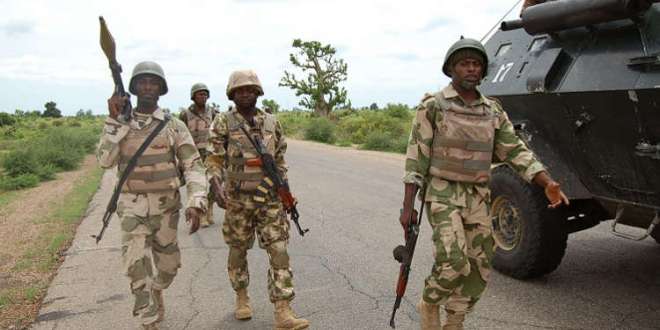Crime
Boko Haram: A Business Empire Demystified?

By Richards Murphy
Let me ask Nigerians these pertinent questions. When security agents arrest suspected Boko Haram terrorists and find in their possession dangerous and high-caliber guns and bombs, does it strike anything in anybody? Or what do people think each time soldiers raid terrorists hideouts /caves and recover materials for the manufacture of lethal explosives used in committing atrocities? Can we understand why the ownership of dangerous weapons is regulated or outlawed in Nigeria, yet terrorists never lacked the supply?
No plausible interpretation of such developments, outside the visible manifestation of the business or entrepreneurial component of Boko Haram Terrorism (BHT). Nigerians are creatively very skillful people in everything they do. It did not take Biafran war mongers too long to begin the manufacture their bombs, called in Igbo vernacular as “ogbunigwe,” or “Ojukwu Bucket,” and other dangerous weapons during the unfortunate Nigerian civil war.
When I first heard of the reality of Boko Haram insurgency years back, my understanding of it was that of a small, negligible sect of religious extremists cum aggrieved thugs waging war on their political godfathers in Borno state, Nigeria. But I was dead wrong as later experiences revealed. It began to expand tentacles to other parts of the Northeast, Northern Nigeria, including Abuja and even the Southern parts of the country.
In 2011, Kogi and a few other states operated caves in forests for the manufacture of bombs and other weapons to feed insurgents with the raw materials they needed to commit the atrocities. That was barely within three years Boko Haram terrorism peaked in the country. Until security agents discovered and dislodged them, it became much easier for terrorists to attack Abuja, with bombs ferried from Kogi, hence it shares boundaries with the FCT. While Nigerians groaned in pains and sorrows, some criminal minds smiled to the banks with fortunes from such transactions with terrorists.
I murmured out loudly upon news that a Christian was among the suspects later arrested by Nigerian soldiers for the Christmas day bombing of churches, including St. Theresa’s Catholic Church in Madalla, Suleja, a Niger state suburb, near Abuja . What motivations that could tempt a Christian to connive with Islamic religious extremists to attack a church. The suspect, arrested in Bauchi state gave his name as Victor Moses and during interrogation, actually confessed to acting as a surveillance spy to the Kabiru Sokoto-led terrorists gang that bombed churches on Christmas day in Suleja.
The chronology of these events is suggestive of the immutable fact that Boko Haram has an active business wing. The indulgence of Nigerians into crime is difficult to erase. That’s why, a criminal, arrested and convicted for a crime and later granted pardon after spending years in jail, walks out of the jail to contrive fresh criminal plots again.
This is Nigeria’s nightmare at the moment in its counter-insurgency war in the Northeast and other parts of the country. The Nigerian military defeated the religious wing of Boko Haram Terrorists (BHTs) in December, 2016. Leader of the anti-terrorism campaigns and Nigeria’s Chief of Army Staff (COAS), Lt. Gen. Tukur Yusufu Buratai led Nigerian troops to accomplish this exceptional military feat, with the final demystification and demolition of Sambisa forest in Borno state. The forest, a colonial reserve was terrorists’ safest haven, where weapons and food were stored. It served as their paradise.
But as a master of the art of war, especially guerrilla warfare, terrorists’ most potent strategy, Gen. Buratai deployed several tactics and strategies to clip the wings of terrorists into defeat. He ensured insurgents sources of arms and ammunitions procurement were blocked; soldiers proceeded to also block sources of food supply to terrorists and their families, thereby ushering a period of unprecedented hunger on the deviants. Furthermore, soldiers combatively prevented insurgents from reckless abductions for ransom or for other such frivolous demands from the government.
As Nigerian troops pursued insurgents, they also went after their veiled agents and fished out many of them as possible. The whole camp of BHTs was in disarray, a development that railroaded the willful surrender and denouncement of the act of terrorism by hundreds of insurgents. They were famished and weakened to an appreciable level, as others too afraid to surrender to soldiers, fled Nigeria to take refuge in neigbouring countries. With sustained sensitization, majority of terrorists faulted the ideological stand of the leader of the sect, Abubakar Shekau, which spared nobody, but attacked mosques and churches, killed both Muslims and Christians’.
The disarray in the camp of BHTs reflected in the split into factions of Boko Haram leadership, one led by Shekau and the emergent faction spearheaded by Musab al-Barnewi.
But as the impact of terrorism in Nigeria waned considerably, agents of the devious sect who profited immensely in weapons manufacture and racketeering, which they found easy and lucrative markets in BHTs operations, were worried. As it is in our character, the business wing of BHTs is the component of Boko Haram insurgents desperately registering presence now with bombs and recruiting new members to terrorize inhabitants of Borno state and Nigeria.
The allied crimes identified with the operations of insurgents are refusing to go away. Aside secret bombs manufacturing business, Nigeria is also experiencing high level of secret importation or smuggling of deadly arms into the country. And sponsors of the illicit trade want to recoup the monies spent, investing in the business and also make profits. We should not live in deceptive illusion. The fact remains that for every cache of arms and ammunitions intercepted by the Nigerian Customs Service or security agents, much more of such arms importations have crossed the borders into Nigeria for circulation unnoticed.
It accounts for the current spate of bombings in parts of Borno. The Boko Haram entrepreneurs’ are not just ready to let go the business. The implied understanding is that if sounds of bombs no longer resonate, it will signal the end of terrorism in Nigeria and the abrupt termination of the thriving business.
This is the present battle against the peace, tranquility and stability of Nigeria. These agents of Lucifer are desperate to return Nigeria back to the dark old days and they have reached out to communities on Nigerian border nations to recruit more terrorists into the country. They have summoned every courage and arsenal to revive terrorism to rescue their business empire, both of which were perished with Nigerian soldiers’ defeat of Boko Haram terrorism.
So, for Nigeria, it is still a long night walk to dawn, insofar these elements have continued to operate almost freely. It is time for the security agencies to collectively resuscitate their intelligence network in partnership to confront these monsters. The Department of State Security Service and the Police have a great deal of work to do in this regard in order to sustain the peace and the victory in the battle against terrorism in Nigeria, as imposed by the Nigerian Army.
Murphy, a security expert writes from Ambo street, Calabar.
Crime
Banditry: Victims’ Families write President Tinubu Over Turji’s Confession, Demand Former Govs Yerima, Bafarawa’s Arrest.
Bothered over persistent insecurity across the country, a coalition of families torn apart by rampant banditry in Northwest Nigeria has appealed directly to President Bola Tinubu to investigate serious allegations against two former governors.
The Coalition of Families Affected by Banditry, representing victims who have lost loved ones, homes, and livelihoods to relentless violence, has written a letter to the President in Abuja.
Exhausted by domestic inaction, they called on the President to help uncover the truth behind claims that policies under former Zamfara Governor Ahmed Sani Yerima and former Sokoto Governor Attahiru Bafarawa laid the groundwork for the region’s insecurity through the seizure of grazing reserves and arming of vigilante groups.
In the letter signed by Chairperson Otuba Rawene, Secretary Sani Usman, PRO Haj. Hadijat Abdullahi, and 20 others, the group said: ” Many of us have lost loved ones in brutal killings, seen family members abducted, or been forced to flee our homes, leaving behind livelihoods and communities destroyed by violence.
“We write to Your Excellency with a profound sense of urgency and responsibility, seeking your support in addressing grave allegations recently made public by notorious bandit leader Bello Turji.
“In a widely circulated video released in December, 2025, Turji accused former Zamfara State Governor Ahmed Sani Yerima and former Sokoto State Governor Attahiru Bafarawa of laying the foundations for the current insecurity crisis.
“Specifically, he claimed that their policies— including the seizure and sale of grazing reserves and the arming of vigilante groups that targeted Fulani communities ignited ethnic tensions and cycles of reprisal violence that evolved into today’s widespread banditry.
“While we acknowledge that Bello Turji is a wanted criminal responsible for countless atrocities, including the deaths of many of our relatives, we believe these allegations warrant serious and impartial scrutiny.
“As the proverb goes, ‘where there is smoke, there is fire.’ Having exhausted domestic avenues for justice often met with inaction or allegations being dismissed we turn to the President, a steadfast champion of human rights and accountability, as our last hope for uncovering the truth and ensuring justice prevails.
“The scale of suffering caused by banditry in Northwest Nigeria is staggering and demands international attention.
Reliable reports indicate thousands of civilian deaths, mass displacements, and profound economic devastation. For instance, between 2018 and 2020 alone, armed banditry caused at least 4,900 deaths.
“In the first half of 2025, over 2,266 people were killed by insurgents and bandits, surpassing the total for all of 2024. Recent data document thousands abducted annually, with verified ransom payments reaching billions of naira (e.g., N2.57 billion between July 2024 and June 2025).
“These attacks have displaced hundreds of thousands, disrupted agriculture and trade, deepened poverty, and inflicted lasting trauma on survivors. Communities live in constant fear, with bandits imposing illegal levies and operating with impunity.
“As victims seeking justice and an end to this cycle of violence, we implore the Nigerian government to publicly to launch a prompt, independent, and thorough investigation into Bello Turji’s allegations against the named former governors. Offer technical assistance or support international oversight to ensure the probe is credible and free from political interference.
“Advocate for broader measures to address impunity, including sanctions if evidence of complicity in serious crimes emerges. We firmly believe that accountability for those who may have contributed to this crisis regardless of their status is essential to breaking the cycle of violence and restoring peace.”
Business
Nestoil: Lagos CP dragged to court for contempt, risks imprisonment

This is certainly not a good time for the Lagos State Police Commissioner, Mr. Moshood Jimoh as he has been dragged to court for commiting contempt by defying a clear court order that he and his men must not go near the business premises of Nestoil Group which belongs to Drawcok Estates LTD.
The fresh suit by Drawcok Estates LTD followed Monday’s deployment of over fifty armed police officers by Mr. Moshood Jimoh to seal off the business premises of Nestoil Group which belongs to Drawcok Estates LTD despite an order by Justice Ofili Ajumogobia.
Also, despite a directive by the federal government that police escorts be withdrawn from VIPs, Mr. Moshood Jimoh illegally allocated several police officers to be guarding Mr. Sulu Gambari, the self-acclaimed Receiver Manager which was appointed by a former judge that was handling the case, Justice Isaac Dipeolu.
Recall that Justice Daniel Osiagor of the Federal High Court in Ikoyi vacated all the orders made by Justice Isaac Deinde Dipeolu who wrongly appointed the Receiver Manager.
Meanwhile, dissatisfied with the action of the Lagos Police Commissioner, Drawcok Estates LTD yesterday filed a case of contempt against the Lagos State Commissioner of Police, Mr. Olohundare Jimoh Moshood (Contemnor) before a Federal High Court in Abuja.
In Suit No: FHC/ABJ/CS/2385/2025, the applicant wants Police Commissioner Moshood Jimoh to be found guilty of contempt of court and also be committed to prison unless he obeys the directives contained in Justice Ofili Ajumogobia’s Order of November 24, 2025.
Recall that Justice Ofili Ajumogobia had on November 24, 2025 ordered that the building in question belongs to Drawcok Estates LTD, adding that no police officer must be seen carrying out orders of the Lagos State Police Commissioner around the premises.
The Orders made by Justice Ofili Ajumogobia on November 24, 2025 in suit number FHC/ABJ/CS/2385/2025 were that:
The applicant has a right to own and possess her properties as mentioned in the addresses above as guaranteed by the 34 Constitution of the Federal Republic of Nigeria, 1999 as amended and the African Charter on Human and People’s Rights..
That the sealing-off and occupation of the applicant’s properties on the addresses mentioned above by the Respondents constitute an infringement on the right of the applicant to own property, as guaranteed by Sections 43 and 44 of the he Constitution of the Federal Republic of Nigeria, 1999 as amended.
That the Respondents, whether by themselves , their agents, agencies and servants, acting for it through them or any other person(s) howsoever described or claiming through them, to vacate the applicant’s properties on the addresses mentioned above, and deliver possession over to the applicant forthwith.
That the Respondents, whether by themselves, their agents, agencies, and servants, acting for or through them or any other person(s) howsoever described or claiming through them, to provide security for the applicant to take back possession of her properties on the addresses mentioned above.
That the Respondents is restrain, whether by themselves, their agents, agencies and servants, acting for or through them or any other person(s) howsoever described or claiming through them, from harassing the applicant and refusing her access to her properties on the addresses mentioned above.
Nigerian Concord Newspapers reporters that visited the business premises yesterday reported that pollice officers have been denying workers of several companies access to their offices located within the Nestoil building in Lagos on the order of Moshood Jimoh, despite a subsisting court order directing that they be allowed into the premises.
The affected workers had resumed duties following a court order delivered by Hon. Justice Ofili Ajumogobia of the Federal High Court, Abuja on November 24, which directed that they be granted access to their offices.
Crime
Police Confirm Abduction of 25 Female Students in Kebbi School Attack

By: Fabian Apechihin
The Kebbi State Police Command has confirmed that 25 female students were abducted and one person killed during an attack on Government Girls’ Comprehensive Secondary School, Maga, in Danko/Wasagu Local Government Area.
Police spokesperson CSP Nafi’u Abubakar said the attack occurred around 4 a.m. on Monday when heavily armed bandits stormed the school, firing sporadically.
According to Abubakar, police tactical teams were deployed immediately after a distress call and engaged the attackers in a gun duel. By the time security operatives arrived, the bandits had already scaled the school fence and abducted 25 students from their hostel.
He confirmed that one person, identified as Hassan Makuku, was shot dead, while another victim, Ali Shehu, sustained a gunshot wound to his right hand.
Abubakar added that additional police units, soldiers, and vigilante groups have been deployed to track the bandits and rescue the abducted students. Security teams are currently combing nearby forests and possible escape routes.
He urged residents to remain calm, stay alert, and cooperate with security agencies as operations continue.
-

 Uncategorized5 years ago
Uncategorized5 years agoFG, states urged to harness flooding for ranching, others with technology – Agbaje
-

 Headlines10 years ago
Headlines10 years agoBreaking: EFCC seals Borno House of Assembly, as Hon members take to their heels
-

 News12 years ago
News12 years agoNigeria Security Operatives Stage Manhunt For Homosexual Perpetrator
-

 News9 years ago
News9 years agoHow 21-year-old Girl fled community over accusation of lesbianism
-

 News10 years ago
News10 years agoYobe Gov Moves Against Deputy
-

 Opinion7 years ago
Opinion7 years ago7 signs she has friend zoned you
-
Technology4 years ago
Online job placement company headhunts women
-

 Headlines10 years ago
Headlines10 years agoBorno Dep Gov Abducts Another Church Leader







